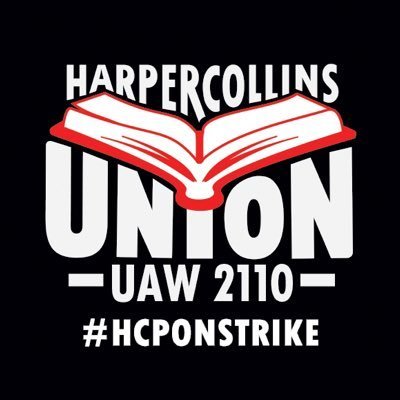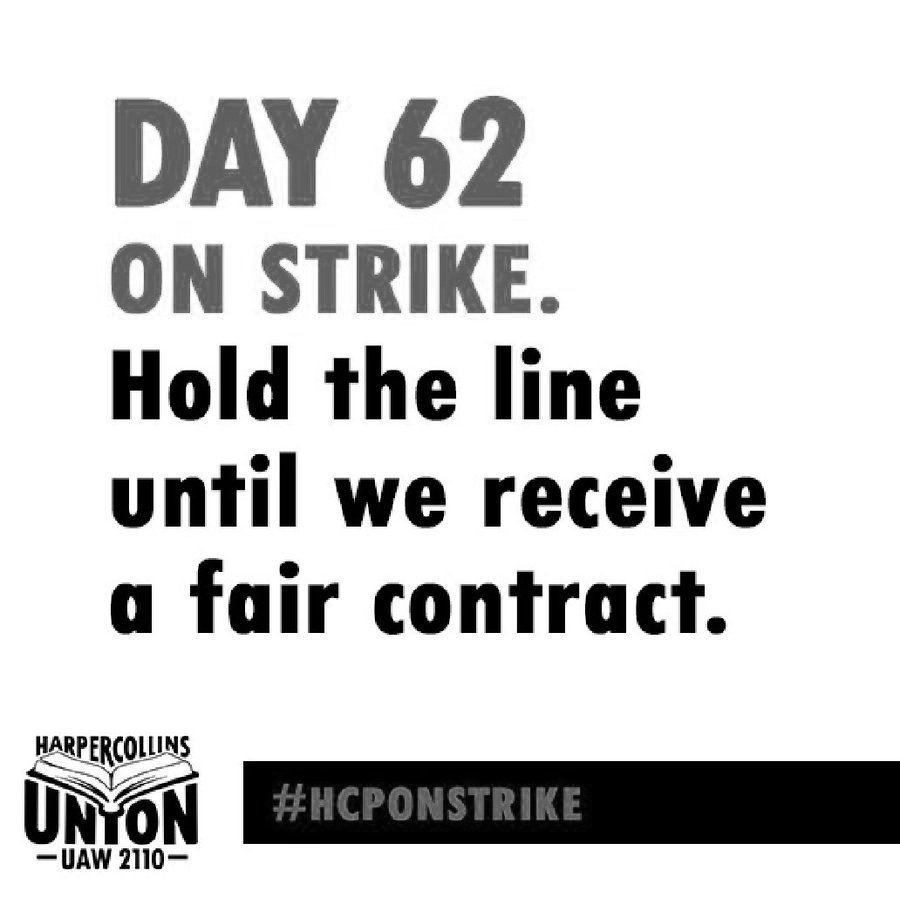Harper Collins Union Strike Hits 20 Days
The HarperCollins Union hits Day 20 of its strike on Wednesday, 7 December 2022.
HarperCollins President and CEO Brian Murray posts open letter to the publishing world.
The workers at HarperCollins have reached Day 20 of their strike “for higher pay, a greater commitment to diversifying staff, and stronger union protection.” The HarperCollins Union is an affiliate of UAW 2110. The strike, authorized in October, comes after months of little progress toward a new contract and a one-day strike in July.
As of Day 20 there’s been “no word from HC,” indicating no progress has been made at the negotiating table. While the publishing house seems unable to find time to speak with its workers, the president and CEO Brian Murray directed an open letter to authors and agents on Tuesday, 6 December 2022.
The open letter addresses the ongoing strike and attempts to frame leadership at the publishing house as good faith negotiators in the contract talks. HarperCollins is attempting to walk a fine line, ingratiating itself with authors and agents while stonewalling its workers. Some authors have been vocal about not taking the bait.
In the letter Murray highlights compensation that is “consistent” with the publishing industry as well as increases to “entry level” salaries.
“Our current compensation offerings are consistent with our peers in the publishing industry. During recent negotiations, we proposed a fair and reasonable pay structure, including increases to entry level salaries.”
Regarding “consistent” compensation:
Labor negotiation observers note that consistency with respect to compensation across the industry is not a virtue if compensation across the industry is artificially depressed by a lack of labor organizing power.
Regarding increases in entry level salaries:
Boosting the salaries of your lowest paid employees provides HarperCollins with good PR at a relatively cheap cost. Labor negotiation observers, however, remain wary of the long term implications.
Without a corresponding and contractually-embedded increase in other types of salaries for longer tenured employees, HarperCollins takes a step towards an Amazon strategy of high turnover employment. The consequences would include a weaker union, a starker divide between the management “haves” and the worker “have nots,” and a less experienced partner for authors and agents to publish a book with.
Later in the letter Murray takes issue with union dues and invokes the rhetoric of “choice” to frame the union as a third-party to the contract negotiations, rather than the collective will of the employees themselves.
“We also believe our employees, current and prospective, should have a choice when it comes to union dues. The United Auto Workers is demanding to include a Union Security clause in their contract. Such clauses typically require substantial union dues to be paid by all UAW-represented employees, including every person who may later be hired into a union job, and would require HarperCollins, at the union's demand, to terminate any employee who does not pay them their dues. We strongly believe that each HarperCollins employee should have the right to make their own choice whether or not to pay dues to the United Auto Workers.”
Given the fact that HarperCollins workers overwhelmingly authorized the current strike by a margin of 194-10, Murray’s point does not pass muster. The employees have made a choice – and that choice is to stand up for fair compensation and a greater say in the workplace.
Brian Murray, CEOBut the rhetoric of “choice” has proved a powerful tool for amplifying regressive voices in debates as diverse as charter schools, gun control, and reproductive rights. “Choice” rhetoric can be a powerful tool in the union dues debate as well, despite ample evidence that the benefits of union dues far outweigh their costs – a point conceded even in the pages of the Wall Street Journal.
UAW president Olga Brudastova isn’t buying what Murray is selling in the open letter. In response to the open letter, via PW, Brudastova commented:
“[that HarperCollins has] once again attempted to third-party the Union and pick and choose numbers and facts to serve their argument that the strike is unjustified."
"But we know this is not true," said Brudastova, "and our supporters, including authors and agents, know that as well."
She continued, "Our last exchange in negotiations was the company rejecting our comprehensive proposal that presented a clear pathway to a fair contract and addressed our core demands. It is disheartening that HarperCollins Publishers choose to hold on to their decision-making power even on issues like union security—a demand that doesn’t cost them any money and receives overwhelming support from our members.”
The present state of the HCU contract talks appears to be a battle for the hearts and minds of authors, agents, and the publishing world at large. Stay tuned as the story develops. Follow @hcpunion for the latest updates.
























